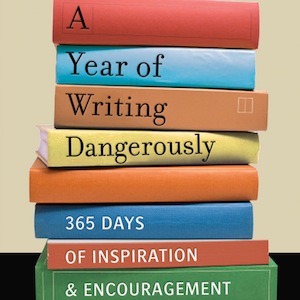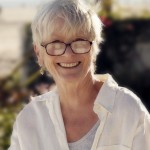A Year of Writing Dangerously (Excerpt)

Excerpted from A Year of Writing Dangerously (New World Library, 2012).
Sacred Space
The date you begin writing, or start a new book, should be memorable, like a wedding date or a birthday.
Sure you can suddenly fly to your computer exclaiming today you start your book, your essay! But preparing for the day, suddenly yearning for the day, making it important, building up energy for it – clearing your space, desk, table, or wherever you’re going to write, setting up objects or photographs you love and making it inviting might be a good way to begin. You’re courting the muse after all.
Take time to get ready. Find books by writers you love, writers who inspire you.
Figure out what time you’ll write. On your calendar put a slash through that time slot so you won’t inadvertently plan something else.
In the end, wherever and whenever you work, make your writing time and your workspace sacred.
“I tell my students one of the most important things they need to know is when they are at their best, creatively. They need to ask themselves, What does the ideal room look like? Is there music? Is there silence? Is there chaos outside or is there serenity outside? What do I need in order to release my imagination?” ~Toni Morrison
The Holy Calling
You may find that your friends and family are somewhat less than respectful of you sitting there in your sacred space. They might even refer to what you’re up to as “typing” or “your new hobby.” Writing is not a hobby. Collecting stamps or coins are hobbies. Writing is a calling.
“I believe that – if you are serious about a life of writing, or indeed about any creative form of expression – you should take on this work like a holy calling. I became a writer the way other people become monks or nuns…I was writing’s most devotional handmaiden. I built my entire life around writing.” ~Elizabeth Gilbert
Choosing Story Over Relatives
Isabel Allende begins all her books on January 8th. She says that she writes the first sentence and then the story begins to unfold. One particular January 8th at the crack of dawn, her agent, Carmen Balcells, called her from Spain and told her to write a memoir.
Allende replied that her family didn’t like to see itself exposed.
“’Don’t worry about anything,” said Balcells. “Send me a two or three hundred page letter and I’ll take care of the rest. If it comes down to choosing between telling a story and offending relatives, any professional writer chooses the former.”
Allende went on to write the memoir but she struggled with having protagonists that were her “own living family, filled with opinions and conflicts…the plot is not an exercise of imagination but an attempt to present the truth.”
As you write, you might want to keep this thought in mind: No one will read what you’re writing until you allow them to. So you are free to write the truth, or whatever you believe to be the truth. You can write dreadful and shocking things from your imagination, you can write badly and sloppily, you can whine and mewl if you want. Because: you can always rewrite, change things, or simply tear it up.
Writing is rewriting. But first you need to have something on the page to rewrite.
“And so I began to write about things I thought I would never tell another soul as long as I lived…” ~May-lee Chai
Getting Caught
I asked a group of students once if writing felt dangerous to them. They all nodded vigorously, so I asked them to write why.
One student wrote: “Writing is dangerous because you might get caught.”
Caught, found out, exposed. The stuff of nightmares.
Is this why writing feels so scary sometimes? We’re caught like a fish on the hook of our own words, our secrets exposed, our inner life and imagination up for inspection.
“Anxiety is not only an inevitable part of the writing process but a necessary part. If you’re not scared, you’re not writing.” ~Ralph Keyes
Daring to Tell
Here’s another response from a student to my question about why writing feels dangerous:
“Sometimes it feels dangerous to know what I really feel. Because if I acknowledge my feelings outside the safe boundaries of my own heart and mind, if I open up the latch to my subconscious and let those precious secrets leak out God knows what will happen. I might have to hold myself accountable to these thoughts and feelings. I might have to act upon them. I might have to change. I might have to stop lying to myself and others about what I need and want. I might have to ask for what I need and want. I might have to be a disappointment, I might have to be disappointed; I will disappoint.”
This quote and the previous one were not written by people who had been hiding in caves for the past decade. They are both very successful professional people and in positions of power and respect, one a doctor and one a religious leader.
We are all scared of disappointing, of venturing past the safe boundaries of our minds and hearts – those of us still hiding in our caves and those of us whose job it is to help others. We all go around wearing masks.
“You know, we do live in ludicrous ignorance of each other. I mean, we usually don’t know the things we’d like to know even about our supposedly closest friends. I mean, suppose you’re going through some kind of hell in your own life, well, you would love to know if your friends have experienced similar things. But we really don’t dare to ask each other.” ~Wallace Shawn and Andre Gregory
Jumping Off
There’s no appropriate place, no safe place to jump off into your writing. In his writing classes, Roger Rosenblatt bursts into singing “Happy Birthday” out of nowhere, and his students stare at him as if he’s gone around the bend. He sings it again, and then tells them to start writing as they hear in their heads this “irritating, celebratory song you’ve heard all your lives.” Then he sings it yet again for them and they lean forward and begin to write.
“But the jumping-off place isn’t always so obvious. You can’t always find the way in. Sometimes you need a side door.” ~Abigail Thomas
The Voice That Chirps and Chips
We’re so good with the negative voices: You idiot, what kind of an idea is that? Who do you think you are to be writing a book? Why are you sitting there in your bedroom slippers writing about your boring life? Who cares? When that voice starts chirping in your head and chipping away at your confidence, here’s what you do, listen to another voice, the sweet, calm voice that’s saying: Just do the work. Tell your story, it’s important. Have faith. If you’re sitting at Starbucks or at the library it’s probably best not to say this out loud, but if you’re home alone – say it loud. And often.
“Know that it is good to work. Work with love and think of liking it when you do it. It is easy and interesting. It is a privilege. There is nothing hard about it but your anxious vanity and fear of failure.” ~Brenda Ueland
Getting Permission
When William Zinsser visited schools to discuss writing, he’d ask students, “What are your problems? What are your concerns?” and suggest that this would be the subject of their writing. But from grade school to college, most students would tell him that they didn’t have permission to write about themselves, the teachers gave them the subjects to write about.
Established writers would tell him they had to write what editors wanted.
If this has a familiar ring to any of you, or if you feel you need permission to write about yourself or whatever you need to write about, I give you permission.
Now you have it. Use it.
“If you write for yourself, you’ll reach all the people you want to write for.” ~William Zinsser
Excepted from A Year of Writing Dangerously by Barbara Abercrombie (New World Library, 2012). Permission granted by the author .










